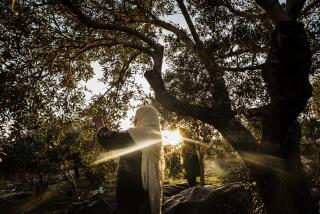In Yemen, chewing khat offers ritual and repose
SANA, Yemen — Lithe men with ladders fan through the grove in the morning light. They joke and taunt. Hands quick in grit and shadow, they harvest the narcotic leaves that set this unsettled nation pleasantly abuzz in the lost hours between midafternoon and dusk.
The men stack and bundle khat, a stubborn, flowering plant that can grow tree-high. The crop is hauled to market on trucks, motorcycles and the backs of boys who scurry along ragged roadsides, where girls, all but their eyes hidden by veils, pretend not to watch before vanishing in the dust.
“I’ve been in this grove as long as I’ve known myself,” said Ibrahim Atheq, who says he’s 23, but the lines around his eyes and the raised veins on his hands betray him. He rustles a branch and the air fills with ashen specks that glisten like strange snow.
“No pesticides,” said Walid Khamesh, his voice drifting down from a treetop. “Just sand and sun and water six months before we harvest. That’s what makes the best khat.”
This nation has long been defined by a flash of green at the tip of a stem. For many, chewing khat makes Yemen’s heat, poverty, rebellions, terrorist attacks, power outages, Islamic fatwas and political turmoil bearable. It calms at first. But its stimulant qualities kick in and suddenly men with leaves bulging in their cheeks, giving them the air of agitated blowfish, launch into talking jags, full of opinions and viewing the world with a restless clarity that eludes them in the non-khat hours.
“It is our beer, our drug,” said one man, spitting out a sprig.
Khat is the nation’s most lucrative crop, but it could also be its demise, sapping resources and resulting in countless hours of lost productivity.
Environmentalists predict that this parched country on the rim of the Arabian Peninsula will run out of water by the end of the decade. Khat cultivation siphons about 40% of the water supply and deters the planting of other crops to feed a population that faces increasing malnutrition, according to the United Nations, in what is already the Arab world’s poorest state.
A campaign against khat began recently, including the founding of the Organization of Yemen Without Khat, which is pushing for a law to prohibit children from chewing the plant. A number of high-profile weddings have banned khat at receptions, leaving guests bewildered and a bit jittery amid tables of cakes and juices.
“I am anti-khat,” said Saddam Kamali, a newlywed. “I wanted my wedding to be free from this plant that costs our country time, money and health.”
He said those attending the ceremony “believed khat gives them the state of being old, gloomy and sad. This is the condition many Yemeni live in during the long hours of chewing. Without khat, one can laugh, but with khat one becomes enslaved by boredom.”
But in harsh lands, rituals offer repose. By 2 p.m., when the sun beats cruelly, anticipation builds in ancient alleys and in markets, where men bicker and bargain, stems and leaves flying, money counted, and boys, like understudy botanists, learn at the elbows of their fathers. New deliveries speed in from fields on the outskirts and orders echo from behind the tinted windows of tribal sheiks whose utility vehicles disappear in blurs of bodyguards and dust.
By Yemeni standards, the men in the khat grove do well. But these days their restive country troubles them. Chaos and violence between tribes, Al Qaeda, a mutinous army and political factions have all hurt business. Many customers don’t risk the drive anymore to Sana’s outskirts, even on Friday, the best day for khat trading.
Some pickers wish that Ali Abdullah Saleh, the strongman who ruled for 33 years before he was forced from power by a popular uprising, would return to office. He’s clever enough — his motto is “dancing on the heads of snakes,” after all — and they suggest he could stage a comeback. The faces of others contort at his mention.
“Saleh is a murderer,” said Ismail Otebah. “We have to give the new government time.”
“In Saleh’s day I made 100,000 rials a month but now a lot less,” said Khamesh. “The revolution has done us no good. People fear for their security. I just want peace. Whether it’s Saleh or whoever, I want calm.”
Another man sidles through the dust, raging against Islamists, who in Yemen, like in other countries of the “Arab Spring,” are rising in political power. “They are a bunch of dogs,” he said. “The Islamists are behind all that’s wrong. Prices go up. Business goes down. We are a country deprived.”
He walks away toward a bundle of khat wrapped in a blue tarp.
A loudspeaker in a minaret crackles; men and boys hurry beyond the grove and market, kicking off sandals, washing feet and faces, prostrating in the cool dim of the mosque. The preacher’s voice starts slow, his deep voice drawing the devout back to centuries past when caravans wandered the Arabian desert.
“The prophet Muhammad left Mecca to Medina,” says the preacher, his voice rising and strong. “He was about to be assassinated. They wanted to scatter his blood among all the tribes. ... But he followed the order from God and God saved him.”
The story of intrigue and adventure around the birth of their religion soothes and quiets the men. By late afternoon, though, the tales have faded and men, bags of khat dangling alongside their traditional daggers, sit on cushions, chewing leaves, chain-smoking cigarettes and pondering matters less divine.
Special correspondent Zaid al-Alayaa in Sana contributed to this report.
More to Read
Start your day right
Sign up for Essential California for news, features and recommendations from the L.A. Times and beyond in your inbox six days a week.
You may occasionally receive promotional content from the Los Angeles Times.







